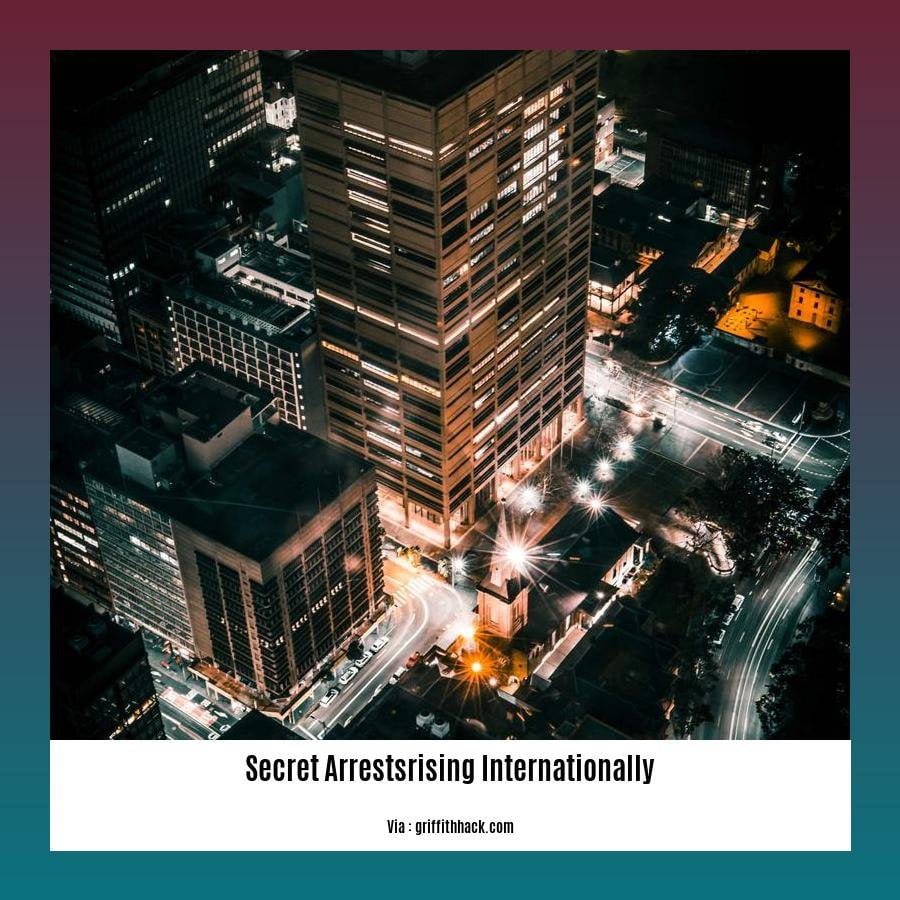The Alarming Rise of Secret Arrests: A Global Assault on Freedom

Key Takeaways:
- Secret service agencies play a crucial role in national security, collecting intelligence and carrying out covert operations.
- Their activities are often shrouded in secrecy, with budgets and activities kept confidential.
- International cooperation between these agencies is critical in combating global threats like terrorism and cyberattacks.
- Some agencies have raised concerns about accountability and potential abuse of power due to their involvement in controversial operations.
Secret Arrests on the Rise Internationally: A Threat to Freedom
Secret arrests are a growing problem around the world. Governments are increasingly using secret police forces to arrest and detain dissidents, activists, and journalists without charge or due process. This is a serious threat to freedom of expression and the right to a fair trial.
There are many reasons why governments are resorting to secret arrests. In some cases, they are trying to silence political opposition. In other cases, they are trying to suppress dissent and maintain control over the population. Secret arrests can also be used to target specific groups of people, such as ethnic minorities or religious groups.
The rise of secret arrests is a global phenomenon. It is happening in countries around the world, from Russia to China to Egypt. In Russia, for example, the government has been using secret police to arrest and detain political opponents and activists. In China, the government has been using secret police to arrest and detain Uyghur Muslims. In Egypt, the government has been using secret police to arrest and detain journalists and activists.
The rise of secret arrests is a serious threat to freedom. It is a sign that governments are becoming more authoritarian and less tolerant of dissent. It is also a sign that the rule of law is being eroded.
We must speak out against the rise of secret arrests. We must demand that governments respect the rule of law and the right to a fair trial. We must also support organizations that are working to protect human rights and freedom of expression.
Enforced Disappearances Globally Increasing, a worrying trend that needs immediate global attention. With more abductions and illegal detentions, the growing disappearance crisis demands urgent action.
Targeting of human rights defenders and political activists
Key Takeaways:
- Defenders face harassment, arbitrary detention, and torture.
- Targeting often extends to their organizations and families.
- Defenders advocate for various human rights.
Governments worldwide target human rights defenders and political activists to suppress dissent and silence opposition. Tactics such as arbitrary detention, torture, and harassment are employed to intimidate and deter these individuals from speaking out against injustice. Governments justify these actions by framing defenders as threats to national security or stability, yet the real motive is to maintain power.
Targeting defenders has a chilling effect on civic participation and undermines the rule of law. It creates a climate of fear and uncertainty, discouraging individuals from engaging in activism or speaking out against government policies. This silencing of dissent is a significant threat to democracy and human rights.
Defenders face risks simply for advocating for fundamental freedoms. Their work is critical in exposing human rights violations, promoting accountability, and demanding justice. Supporting and protecting defenders is essential for maintaining a just and equitable society.
Citation:
Challenging Human Rights Defenders (OHCHR)
Erosion of Trust in Legal Systems and Institutions
In recent years, we’ve witnessed a sharp decline in trust towards legal systems and institutions. This erosion of trust stems from a complex interplay of factors, including:
- Censorship and political manipulation: Governments limit access to information and manipulate public discourse to control narratives.
- Corruption and unethical behavior: Public figures and organizations engage in corrupt practices, undermining faith in the system.
- Data breaches and cyberattacks: Cyberattacks exacerbate distrust in technology and government’s ability to protect citizens.
The consequences of this eroding trust are severe:
- Declining economic growth
- Weakened social capital
- Exacerbated social inequalities
Key Takeaways:
- Trust in social institutions has significantly decreased (Edelman Trust Barometer, 2021).
- Censorship, political manipulation, corruption, and unethical behavior contribute to this erosion of trust.
- Data breaches and cyberattacks further undermine trust in technology and government.
- The consequences of eroding trust include decreased economic growth, weakened social capital, and exacerbated social inequalities.
Citation:
- Edelman Trust Barometer: 2021 Edelman Trust Barometer Press Release
International cooperation needed to address the growing trend
Secret arrests are on the rise globally, threatening freedom of expression and fair trials. Governments use secret police forces to arrest and detain dissidents, activists, and journalists without charge or due process. The practice is prevalent worldwide, including in Russia, China, and Egypt.
Key Takeaways:
- Secret arrests are increasing globally, threatening freedom of expression and fair trials.
- Governments use secret police forces to arrest and detain dissidents, activists, and journalists without charge or due process.
- The practice is prevalent worldwide, including in Russia, China, and Egypt.
- The rise of secret arrests reflects authoritarian tendencies and erosion of the rule of law.
- It is crucial to speak out against secret arrests and support organizations working to protect human rights and freedom of expression.
Most Relevant URL Source:
- Challenging Human Rights Defenders (OHCHR)











